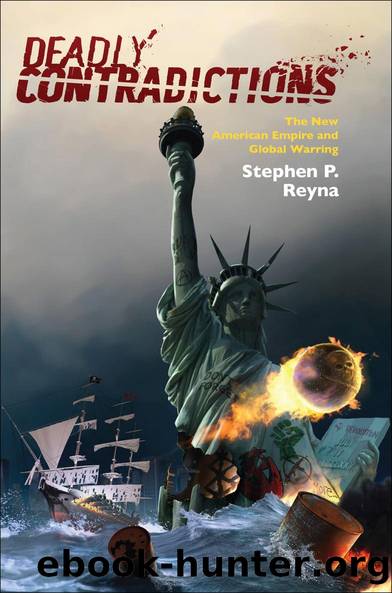Deadly Contradictions by Stephen P. Reyna

Author:Stephen P. Reyna [Reyna, Stephen P.]
Language: eng
Format: epub
Tags: Social Science, Methodology, Political Science, International Relations, General, Anthropology, Cultural & Social
ISBN: 9781785330797
Google: OnhNjwEACAAJ
Publisher: Berghahn Books
Published: 2016-08-01T05:21:47+00:00
A âZone of Ignoranceâ and Malinowski
Religious faith ⦠fixes ⦠all valuable mental attitudes, such as ⦠courage and confidence in the struggle with difficulties. (Malinowski [1948] 1954: 89)
Starting in the late 1970s economic elites became involved in hermeneutic politics that relied on neoliberalism to fix the vulnerabilities provoked by the contradictions. The politics failed. Offshoring and financial fixes did not fix cyclical problems, and the specter of global warming caused âpanicâ while peak oil went âoff a cliff.â Here, then, were fixless fixes to hermeneutic puzzles whose solution concerned humanityâs fate. The words of Malinowski will become relevant following consideration of important economic elitesâ perceptual understanding of this situation.
A good place to begin is with Ben Bernanke, head of the Federal Reserve during the Great Recession. Bernanke came from a rural, southern background in Dillon, South Carolina. His father owned a drugstore. Young Ben was a âbrainâ (he taught himself calculus) and went to Harvard and then MIT for his doctorate, about which certain wags chant: âMIT, PhD, M-O-N-E-Y.â Bernankeâs (1979) doctoral dissertation, titled âLong-Term Commitments, Dynamic Optimization, and the Business Cycleâ, dealt with business executives and the âbusiness cycleâ (conventional economistsâ way of conceptualizing cyclical contradictions). Bernanke (1979: 2) analyzed âthe problem of making irreversible investment decisions when there is uncertainty about the true parameters of the stochastic economy.â A stochastic process is one where the outcome is unpredictable. A stochastic economy is one where the different production, distribution, and consumption results are uncertain. Bernanke told the world in his dissertation that when things are uncertain, economic elites âwait for new informationâ (ibid.). Brilliant! Ben was in the M-O-N-E-Y, ascending the ranks of government economic positions, until in 2002 he was appointed to the Federal Reserveâs Board of Governors, becoming its president in 2005.
In a 2004 speech entitled âThe Great Moderation,â Bernanke was pretty certain of one thing: that, due to the effectiveness of contemporary macro-economic policy, the volatility of the business cycle had decreased to the point that it should no longer be a major topic in economics (in Krugman 2009: 10). This judgment was rendered after the recessions of the 1970s, 1980s, 1990s, and 2000, and just three years before the Great Recession. Three years later in 2007, during the eruption of grave volatility that was to be the Great Recession, Bernanke reached back to doctoral stochastic memories and asserted that a prime attribute of the current economy was âuncertaintyâ (2007). Of course, it would have been in times of uncertainty that Sir Mervyn King, then governor of the Bank of England, confided to a Telegraph reporter, âWho knows whatâs going to happen tomorrowâ (Aldrick and Kirkup 2011).
Other respected economic elites were of like mind. In an analysis of the US economy, Michael Spence, a Nobel Prize winner in economics, and his colleague Sandile Hlatshwayo concluded that employment problems had emerged. In their judgment about what will happen with this âemployment situationâ being âunknown,â âanswersâ as to what to do âappear to be missing,â so âexperimenting is the only way to solutionsâ (Spence and Hlatshwayo 2011: 38).
Download
This site does not store any files on its server. We only index and link to content provided by other sites. Please contact the content providers to delete copyright contents if any and email us, we'll remove relevant links or contents immediately.
The Secret History by Donna Tartt(19089)
The Social Justice Warrior Handbook by Lisa De Pasquale(12190)
Thirteen Reasons Why by Jay Asher(8910)
This Is How You Lose Her by Junot Diaz(6887)
Weapons of Math Destruction by Cathy O'Neil(6280)
Zero to One by Peter Thiel(5802)
Beartown by Fredrik Backman(5754)
The Myth of the Strong Leader by Archie Brown(5508)
The Fire Next Time by James Baldwin(5446)
How Democracies Die by Steven Levitsky & Daniel Ziblatt(5219)
Promise Me, Dad by Joe Biden(5153)
Stone's Rules by Roger Stone(5088)
A Higher Loyalty: Truth, Lies, and Leadership by James Comey(4964)
100 Deadly Skills by Clint Emerson(4925)
Rise and Kill First by Ronen Bergman(4789)
Secrecy World by Jake Bernstein(4753)
The David Icke Guide to the Global Conspiracy (and how to end it) by David Icke(4720)
The Farm by Tom Rob Smith(4513)
The Doomsday Machine by Daniel Ellsberg(4490)
